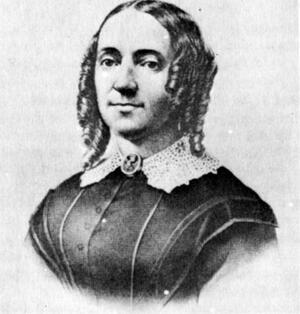Ernestine Rose
Ernestine Rose (1810-1892) was a pro-suffrage, anti-slavery orator in the United States whose activism was recognized by contemporaries as a key contribution to the suffrage movement.
This photo is in the public domain.
An early feminist who inspired Susan B. Anthony, Ernestine Rose was particularly remarkable for her insistence that women’s rights and slave emancipation needed to be approached as one issue: the freedom of all people. At sixteen, Rose refused to marry the man her father had chosen for her and won her independence through the civil court. She travelled extensively after this, helping found the Association of All Classes of All Nations in 1832, and settling in America in 1835, where she became known as “Queen of the Platform” for her compelling speeches on abolition, women’s rights, and public education. She collaborated with antislavery and women’s rights campaigners including Elizabeth Cady Stanton, Lucretia Mott, Sojourner Truth, and Frederick Douglass, and began speaking tours with Susan B. Anthony in 1850. In 1869, she helped pass New York legislation that allowed married women to retain their property and have equal guardianship of their children. Although Rose died decades before women had the right to vote, Susan B. Anthony considered her (with Mary Wollstonecraft and Frances Wright) to have pioneered the women’s suffrage movement.
More on Ernestine Rose
- Encyclopedia Article: Ernestine Rose
- This Week in History: Suffragist and anti-slavery activist Ernestine Rose addresses annual Thomas Paine dinner
- Blog: This Women’s Equality Day, Let’s Celebrate the Women Who Got Us Here
- Blog: An Interview with Elaine Weiss, Author of "The Woman’s Hour"
- Blog: Democracy is Not a Spectator Sport: Reflections on the Centennial of Women’s Suffrage



